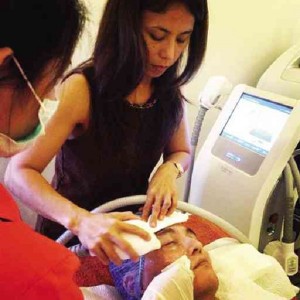If you notice your upper eyelids droop to the point that your eyes are tearing up or are getting infected, you might already need treatment for the condition called dermatochalasis, the formation of excess eyelid skin, particularly on the upper eyelid.
The condition also manifests as a decrease in skin elasticity. The connective tissue underneath the skin becomes lax, and the lids look “baggy.”
Dr. Juan Antonio Javellana, an ophthalmologist at a posh hospital in the south area, described dermatochalasis: “When the upper eyelids override the lower eyelids on the outer portion of the eyes, usually tears and a sweat pool in the area (forms). Bacteria (thrive) in that moist environment, and patients may develop symptoms of tearing or even infection/angular blepharitis. We treat infections with antibiotic drops, but if the anatomy remains the same, then the infections can recur.”
Javellana revealed, “We usually see dermatochalasis in patients as young as 40. Prevalence increases as we get older.” He added that “because dermatochalasis is commonly a problem of aging, it is fairly prevalent although there are no local statistics as far as I know to indicate its incidence.”
Javellana said that patients don’t usually complain about the condition unless it’s giving them other problems like tearing or infections, or if “cosmetically, it looks unappealing.”
“The rest who don’t have symptoms usually just attribute them to ‘part of growing up,’” he quipped.
Amy Patdu, a skin specialist based in Alabang, Muntinlupa, uses an advanced Israeli technology on skin tightening, rejuvenation, wrinkle reduction, collagen renewal and acne clearance. The technology is called Endymed’s 3Deep Radiation Frequency, and involves painless noninvasive procedures. The same principle is applied in Patdu’s iFine technology, a nonsurgical treatment for cases like dermatochalasis.
New in the market
Javellana disclosed to Inquirer Science/Health that iFine is relatively new in the market.
He said: “I came to know about it only about a couple of months. I have referred about three patients for iFine/Endymed treatment who I think would do well with the treatment. They are patients whose conditions are not so extreme, but are bothered by the tearing and mild infections, and they are not really keen on going under the knife (blepharoplasty). I’m excited about the results. I’ve had the procedure done on myself. It is comfortable and pain-free.”
On the novelty of the product Javellana remarked: “I’m not sure if there is anything similar to it out there. Our oculoplastic colleagues and other physicians might not be aware that it is something they can add to their treatment regimen.”
Still, he reiterated that not all dermatochalasis cases can be treated without surgery. “(Those that require surgery) I will send over to our oculoplastic surgeons. Those who have mild to moderate conditions and seek alternative treatments, I will have them consider iFine. Since dermatochalasis is an effect of loose collagen, and Endymed targets that layer, intuitively it should work well for them.”
Javellana added that he can also see the potential of iFine for patients who have had eyelid surgery, and would want to maintain the results of the surgery in the long term without undergoing repeat operations.
“I think iFine would also work for fine wrinkles around the eyes, and crows feet,” he said.
Pros, cons of surgery
Javellana enumerated the pros and cons of surgical procedures: Surgery does end in visibly dramatic results, and it works well for extreme cases. However, patients have to endure postoperative pain; there will be a period of recovery, which would result in downtime for the patient; and surgery does cost money.
iFine, on the other hand, is painless (Javellana described the treatment as “like a massage around the eye”), and there is no downtime (one can go on their usual routines right after treatment). The results also last longer (for up to six months). However, not all dermatochalasis can be treated by iFine, and there needs to be careful selection of ideal patients with realistically managed expectations.
The 3Deep iFine treatment handpiece, specifically designed to treat hard-to-reach skin tissue around the eyes, targets the fine lines and wrinkles found in the delicate thin-skin areas surrounding the eyes.
Patdu said Endymed is one of the best alternatives for non-surgical face, eyes and body tightening. She also considers it the “next level” in Fractional RF microneedling skin remodeling. She can be reached at www.amypatdu.com.ph.
